Issue Number 14, Fall 2011
Contents
- Great Swamp by John Smith
- Ship of Fools by Grace Marie Grafton
- Pelagic Messengers by Robert Coats
- And Now It's October by Barbara Crooker
- Beginning Birding by Susan Cohen
- Anthem by Molly Fisk
- The Idea of Disorder in Key West by Alex Cigale
- Snorkeling in Bonaire by Laura Sobbott Ross
- The Crow by Lois Marie Harrod
- Not Being Able To Speak by Linda Benninghoff
- The A of the B by Carol Dorf
- A Glass of Water by Bradley Hoover
Archives: by Issue | by Author Name
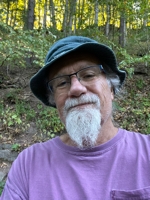
Great Swamp
by John Smith
John lives on the New Jersey side of the Delaware River in the Lower Delaware watershed.

As kids we skinny dipped
in the Passaic River
off of White Bridge Road
where the water made a clean break
from the Great Swamp
and headed south.
Swinging out over the stream,
we let go the rope
and parted water,
plunged our toes deep
in the leechy mud
then sprang back
and broke surface with a scream.
We took turns at the rusty wheel
of an abandoned Chevy
imprisoned by birch trees
and told bloody stories
of young lovers parked
in the murky dark.
We believed in campfire guitar,
our smoky voices rising
like tributaries
into the mouth of the night.
But even as we sang,
the river was dying.
National Gypsum dumped
asbestos in the water downstream
—the first of many things
we weren’t aware of
on the way to the ocean.
Previously published in New Jersey Audubon.
© John Smith
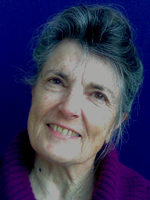
Ship of Fools
by Grace Marie Grafton
Grace lives in the wooded hills of Oakland, California, in the Sausal Creek watershed. Outside her kitchen door is a second growth redwood tree, part of a landscape that was blanketed with old-growth redwoods at the time of the California gold rush, and a short walk east from her house is the wilderness area of Redwood Regional Park, where she loves to hike.

Choosing won’t cut it because
there’s always the trapdoor of tomorrow.
Loyalty, is the general’s answer.
Patience, says the sage from the back of the boat.
But leaves keep falling, they
hold falling in green pockets,
there is no parachute, there’s no
knowledge, in leaves, of spring.
Each leaf’s different, though we humans
would remake the world “just that way.”
Look at the hybridizer, making
the present rubrum lily flarier,
more maroon. The chef records
her recipe for papaya lime tart, exact
measurements, arboretums are constructed.
We, like the Emperor Qin, keep burying
clay soldiers we expect to see again after death.
© Grace Marie Grafton
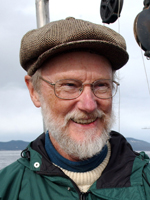
Pelagic Messengers
by Robert Coats
Bob lives in the watershed of Blackberry Creek, a small urbanized but partially-restored tributary of San Francisco Bay. He may also be found occasionally in the Tahoe basin, where he is studying the impacts of climate change.

First came the rays,
cruising the cove, wing-tips
flicking the air, spiky
tails jutting up.
Yesterday a dark speckled torpedo--
a three-foot Chinook on her way upriver--
lazed along the shoreline,
eyeing me as I ate lunch.
Today a smooth-hound shark
slipped in with snaky grace,
dorsal fin slicing the surface
to snuffle the high-tide sodden
salt grass at my feet.
Messengers from ocean and estuary
with news from their world of
diatoms, squid and crunchy clams,
of coastal up-welling and oceanic gyres.
News of changes
we have yet to imagine.
© Robert Coats

And Now It's October
by Barbara Crooker
Barbara recently moved to an apartment in a retirement community in rural northeastern Pennsylvania facing wetlands and the Little Cedar Creek.

AND NOW IT’S OCTOBER,
the golden hour of the clock of the year. Everything that can run
to fruit has already done so: round apples, oval plums, bottom-heavy
pears, black walnuts and hickory nuts annealed in their shells,
the woodchuck with his overcoat of fat. Flowers that were once bright
as a box of crayons are now seed heads and thistle down. All the feathery
grasses shine in the slanted light. It’s time to bring in the lawn chairs
and wind chimes, time to draw the drapes against the wind, time to hunker
down. Summer’s fruits are preserved in syrup, but nothing can stopper time.
No way to seal it in wax or amber; it slides though our hands like a rope
of silk. At night, the moon’s restless searchlight sweeps across the sky.
© Barbara Crooker
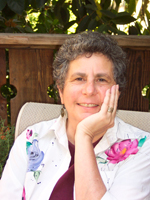
Beginning Birding
by Susan Cohen
Susan spends much of her time looking for birds in both the San Pablo Bay and the Bodega Bay watersheds of Northern California.

Before I found its page among the passerines,
I’d never seen a Black Phoebe.
I learned its family name means Tyrant Flycatcher;
and there it was outside my window, bullying insects!
It sallied off a phone wire — cursive flights
to make each midair snatch. The next day, too,
I saw one in the yard: sooty and white;
twitchy-tailed and crested. It said: seek, seek.
I saw another one next door, and when I strolled,
a Phoebe followed me gate to gate.
Black Phoebes waited everywhere I looked,
that obscure word you learn – then notice daily.
Though birds have no need to be written,
I felt I’d called Phoebes into being
from an alphabet of feather and full throttle.
How quickly it becomes about possession.
Soon, I was naming more birds into sight:
Let there be Bewick’s Wrens and Hairy Woodpeckers;
Rufous-sided Towhees, Yellow-rumped Warblers.
Let there be Sharp-shinned Hawks!
Previously published in Poetry East.
© Susan Cohen
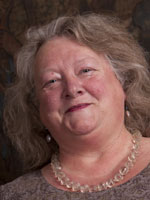
Anthem
by Molly Fisk
Molly lives in the south fork of the Yuba River's watershed, about 50 feet from Rush Creek, which does rush in winter but is dry in summer, helping her remember that seasons change, disappear, are reborn, and so are we.

I have heard this music before,
saith the body.
—Mary Oliver
Always the heart repeats its true name.
The twin bellows of lung fill and soften, and soften
further, and fill, a song heard in the pines,
in the eaves of houses emptied in summer—
a gurgle of laughter, water. I am alone,
like the fox, alert on an unused road, still.
Listening. Wild radish and lupine, larkspur,
the grasses: bright flags of the generous world.
And since yes requires its answering no,
the snapped neck of a deer splayed half-across the path
and a pair of raucous crows. Farther along, something,
a vole or hapless mouse, gathered and dispersed
in the delicate cough ball of an owl.
This is when it gets difficult: learning how to live.
A sliver of burnished ocean sings beyond the hills
and the sturdy heart blesses its own reflection.
Previously published in Listening to Winter (Roundhouse/Heyday Press, 2000).
© Molly Fisk

The Idea of Disorder in Key West
by Alex Cigale
Alex was born on the Prut (Western Ukraine,) grew up on the Neva (Leningrad,) went to college on the Huron (Michigan,) lives mostly along the river called North (NYC on the Hudson) in which each summer he swims, but is intimate with the river of grass (the Everglades) and the Red River (Colorado), where he is most alive.

Land that began as a mound of seashells.
Million-year accumulation of coral sand.
A profusion of palms and poinsettias.
Querulous cacophony of grackles.
Common, flagrant commotion of starlings.
The hawk’s arrow-like peregrination.
Pelican’s headlong pummeling plummet.
Cormorants, vultures, ospreys, and sea gulls.
Clutches of Rhode Island Reds, hens with chicks.
Rock jetty breakwaters projecting from beach.
Lighthouse and keeper’s cottage half-mile inland.
Speedboats thrashing past cruise ships, scheduled flights.
The offshore oil platforms that aren’t yet there.
In reverse order, erase the inessential.
Previously published in Tar River Poetry.
© Alex Cigale

Snorkeling in Bonaire
by Laura Sobbott Ross
Laura lives in central Florida in the Upper St. John's Watershed.

Tow and pitch of tide,
its translucent aqua lip
easing across
a shoreline of snipped coral,
the sand blasted facets
of sea glass emeralds.
I tip my face into another universe,
breath in. Crimped in neon,
fishes scatter, eyes flat as hard candy.
Down here, anything
with a little give
goes diaphanous.
The silky current
shushing the howl of tourists
and orange awnings.
Strangers with masks on,
we are careful
not to bump against one another
as we chase what hovers and flits,
the iridescence that ribbons
from scale to scale and back
on shore, beyond
flat, furred stones,
the fish will surface
like stars from their cool well.
Earth, soft as a breadcrumb,
shedding rings that tempt and widen.
I know the way the limpets
don’t want to let go.
© Laura Sobbott Ross

The Crow
by Lois Marie Harrod
Lois lives in the Stony Brook watershed in Hopewell, New Jersey, a sweet little town that has been here since the l8th century. Though close geographically, it seems far from the turnpike-oil-refinery New Jersey.

The crow sat leafless
in the silent tree
while others whippoorwilled
and chickadeed
or whet, whet, whetted
the dawn
with their bloody blades
of song
until the mockingbird
like me
began singing
for the absentees
the cats and whistles,
cell phones and bells
car alarms, thistles
sirens and shells.
The mockingbird
my brother
singing for others
what he could not sing for himself.
But the crow sat leafless
in the silent tree
no song for himself
or another,
a homeless bird
his black cloak
hunched around
his thin shoulders
making us all
lonely.
© Lois Marie Harrod

Not Being Able To Speak
by Linda Benninghoff
Linda lives in the Northern Long Island Watershed in back of Caumsett State Park and less than a mile from the Long Island Sound.

The worse tragedy was being born,
then not being able to speak about
the life of fish
sun shining on scales
life of pelicans,
wings coated with whiteness.
If the ocean took
these lives together and
held them
like a mother,
the sun might tick
with eagerness to shine.
Night sky would bring peace.
But because I cannot speak
and someone did not value them,
all these lives are going,
silent shining fish,
yellow fin tuna, crab, pale pelican.
Grasses undulate beneath waves.
Previously published in Poets for Living Waters.
© Linda Benninghoff

The A of the B
by Carol Dorf
Carol lives between Strawberry Creek and Schoolhouse Creek where they pass on their way from the Berkeley hills into the San Francisco Bay.

The A of the B
has little to do with taking off our hats
and walking through the double doors. So many
things occur when we aren't there to write
notes. Subspecies unfold from DNA
mishaps, and millions of years go by before
we arrive to pay any attention.
Like the way London sparrows were blacker
than their rural cousins. Actually
that happened pretty quickly: punctuated.
Close enough that encountering the other
could lead to something, to offspring. Now
the black fogs have dissipated; and the sparrows?
© Carol Dorf

A Glass of Water
by Bradley Hoover
Brad lives in the Wolf Creek sub-shed of the Upper Bear River Watershed in the foothills of the Sierra Nevada.

After Paul Johnstone pushed through the swinging doors and collapsed onto the marble floor, everything went black. When he awoke he was slouched in a chair, staring glassily about the room. There were many others in similar postures lining the walls of the room. They look beaten and hollow, as if they were longing for something unattainable and knew it. Johnstone’s gaze settled onto a sign made of the same marble that his feet rested on—
Blue Hydra Hydration Room.
He started to ask the person next to him a question but stopped when the words failed to emerge from his throat. Looking down, he noticed a blue tag dangling from his left wrist with the number sixty-one on it.
“Forty-four,” a recorded female voice said to the room. “Blue Hydra patient forty-four may approach the window. If applicable, please have your water insurance card or policy number ready.” Johnstone watched a man step awkwardly toward a window at the far end of the room and thought of his young daughter Flora who was just learning to walk, her tiny feet stamping a halting, uneven pattern against their apartment floor. He felt panicked and wondered where she was and if she were all right; he hadn’t seen her in several days, since he’d begun a desperate search for a job after the company he worked for had announced it was moving overseas and closing immediately.
More people were called to the front; Johnstone first heard and then spotted a woman behind the counter answering phones. Every time she picked up the receiver she said, “Policy number, please,” and then she would ask the caller a series of questions—often she had trouble communicating with the person on the other end of the line, as if they couldn’t quite understand each other. Behind the woman, lined up against a wall, were about eight clear, glistening water stations with a Blue Hydra logo stamped across their fronts. Johnstone really wanted—needed—some water, and quickly, but he knew he wasn’t entitled to any, not since he had lost his job and subsequently his water insurance. And his family. How long could they hold out? This is why he had been looking so frantically for a job.
“Sixty-one,” a recorded female voice said to the room. “Blue Hydra patient sixty-one may approach the window. If applicable, please have your water insurance card or policy number ready.” Johnstone stood up and approached the window, the tag dangling from his wrist. “Are you a Blue Hydra customer?” the lady behind the counter asked.
His voice all but gone, Johnstone managed to whisper that he was a Blue Hydra customer three days ago but that he had lost his job and . . ..”
“So no,” the lady said. “How do you intend to pay for hydration services rendered?” Standing and staring blankly at the woman, and then beyond her to the glistening water bottles lined up against the wall, Johnstone thought back to the old days when water was readily available—even in fountains on the street! All one had to do was push a button. But the men in suits had talked to other men in suits and there were even a few women involved and it was decided that it was best for the United States of America to sell drinking water, and drinking water insurance, and to pump poison (they called it a “liberating agent”) into all “non-salable” water, which was water not under control of the men in suits, rendering it undrinkable. And a few questioned whether it was best to poison our drinking water and were asked in return why they hated America so much.
“How do you intend to pay for hydration services rendered?” the lady repeated.
The truth was, Johnstone had no money, and thus no way to pay for hydration services rendered.
Two men in white vests with the Blue Hydra logo on the front approached an exit door behind the counter. One of them asked the other one if he were going to fill his second pool with Blue Hydra water, and then they laughed.
“And how do you intend to pay for the blue tag we put on your arm?”
Johnstone could no longer speak. His voice was totally gone, blown away like dust. His Adam’s apple felt like a golf ball lodged in his throat. The lady behind the counter asked him to step to the side and then pushed a button. ““Sixty-two,” a recorded female voice said to the room. “Blue Hydra patient sixty-two may approach the window. If applicable, please have your water insurance card or policy number ready.” As Johnstone moved to his left, a hydration nurse noticed him and started toward him, smiling.
“You’re Flora’s father, aren’t you? Flora goes to childcare with my Annika.” When she saw Johnstone fail in his attempt to reply, she asked the lady behind the counter why he hadn’t been provided with any water when he was obviously in need of some. Johnstone’s eyes managed a faint sparkle; perhaps he could go behind the counter right then and drink from one of the glistening tanks of pure water.
“He has no insurance,” the lady behind the counter answered.
“Can’t we give him grade D, E, or, hasn’t Corporate just up with a new grade F water, with an amount of poison that is only lethal if you drink more that a quart of it?”
“Blue Hydra, please hold,” the lady who was answering the phone said. “I think you can drink two quarts of it without dying.”
A male hydration nurse came over. “In hydration academy they told us it was two pints.”
Another worker came over, smiling. “Why don’t you just check the Evidence of Coverage and Hydration Contract booklet?”
The male nurse said that if Johnstone had had even base-level water insurance, he would only be responsible for the first eighty percent of hydration services rendered up to the first thousand dollars; then he would only be responsible for seventy percent of the next ten thousand dollars.
The lady on the phone looked annoyed and said, “He’s responsible for the first eighty percent of the first three thousand dollars that he would have been responsible for, had he had base-level water insurance.”
Johnstone felt as if he were about to float and in fact thought of dandelion spores floating lazily across a sun-lit meadow as a man in a suit came up and reminded every one that Johnstone would be covered at the amount the lady on the phone stated but that his family would not necessarily be covered. It depended on the circumstances of their thirst event. Furthermore, he stated, Johnstone and his family would only be partially covered for the first hundred thousand dollars in a calendar year, and that after, he would be responsible for the whole amount. The lady at the counter started to disagree with the man but stopped when she, along with every one else, heard Johnstone’s head slam with a resplendent clarity against the counter, followed by his body slinking slowly onto the hard marble floor next to a growing stream of red.
© Bradley Hoover